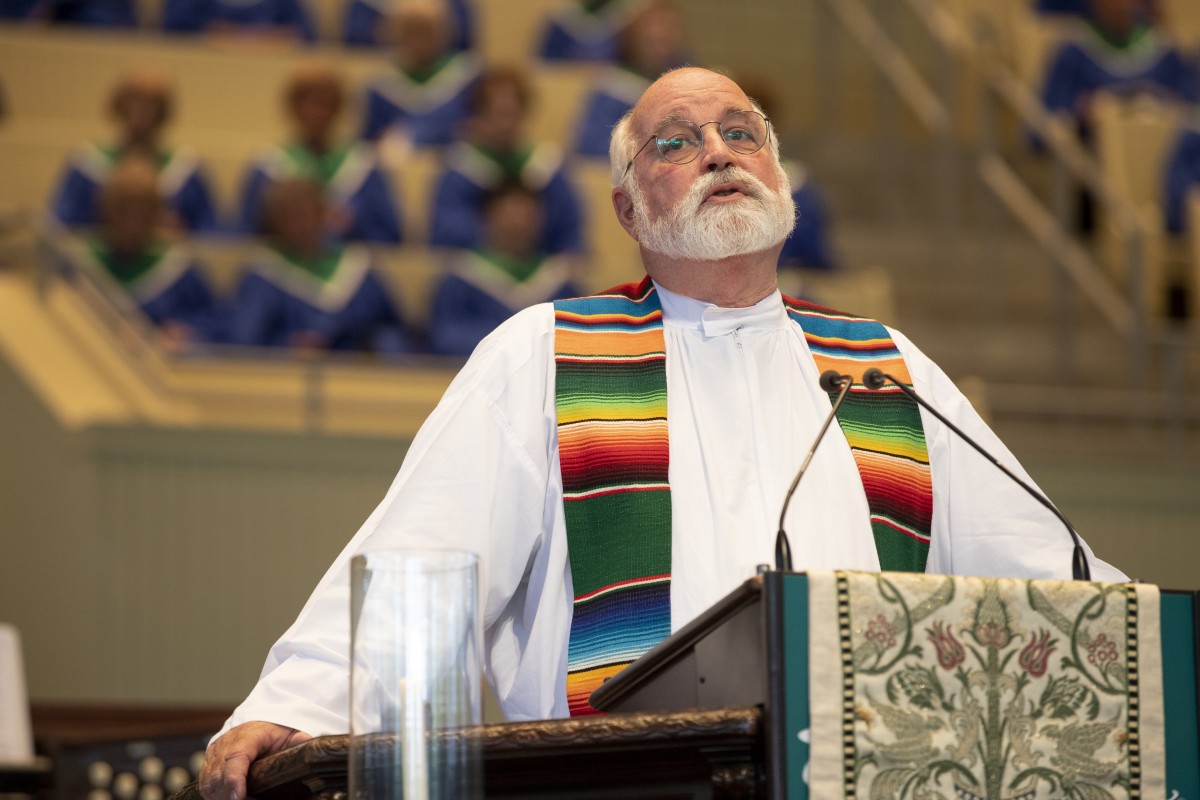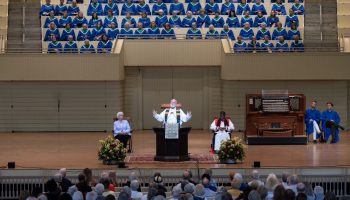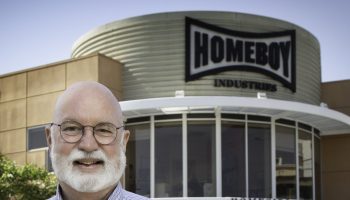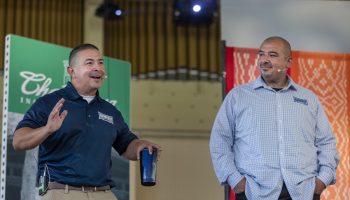An usher at the Amphitheater stopped me and said that she had quoted me to someone,” said Fr. Greg Boyle, S.J. at the 9:15 a.m. Friday service of morning worship on July 20.
“She said, ‘Someone was talking about how hot it was and I said, I know what Fr. Greg would say: No shit.’ ”
“I was hoping for a lofty theological notion,” he added.
His sermon title was “If it ain’t a pleasure … it ain’t a poem.” His Scripture reading was John 15:9-17, Jesus’ commandment to love one another.
He was a guest on a radio call-in show in Spanish in the morning drive time. There was a call from Filiberto from Downey.
“I thought, ‘I know a Filiberto from Downey,’” Boyle said.
“Hey, G, its me, Fili,” a booming voice said. “I am not feeling too good today, so I won’t be at work.”
He had chosen a morning radio show to call in sick.
“I went out to the parking lot,” Boyle said, “And I realized that I did not want anyone’s life but my own. I saw the unbearable beauty in my life. We can choose to be joyful. God doesn’t want anything else.”
Poet William Carlos Williams wrote, “If it ain’t a pleasure … it ain’t a poem.” Pope Francis’ first encyclical was titled “The Joy of the Gospel.”
“He did not call it ‘The Grim Duty of Following Jesus’ or ‘The Thrill of Being Catholic,’ ” Boyle said. “We need to exhale joy into a world that needs it because the opposite of depression is delight.”
Dreamer is a Homeboy who got in and out of trouble in his 20s. He has a dangerous sense of humor, Boyle said. Dreamer would get a job and then gravitate to vague criminality, like selling and using drugs.
When Dreamer finally decided to enter recovery, he needed a job and Boyle found him one with Gary, who owned a vending machine company. Dreamer started working there the next day.
Two weeks later, he was back in Boyle’s office. He reached into his pocket and pulled out a paycheck.
“Damn, G, this paycheck makes me feel proper,” Dreamer said. “You know who I have to thank for this job, don’t you?”
Boyle looked pleased with himself and said, “Who?”
“Well, God, of course,” Dreamer said. “You thought I would say you.”
They laughed about it and Dreamer said, “If we were living in Genesis times, God would have struck down your ass by now.”
“I was not sitting there as provider, and he was not sitting there as recipient,” Boyle said. “We had entered mutuality.”
In another story about Homeboys, Boyle described taking Sammy and Joey out to dinner to a burger place. Joey asked if there was mayonnaise on the burger. The waiter told him no.
There can’t be mayo, Joey insisted.
“What’s the problem?” Boyle asked. “You both can’t be allergic to mayo.”
“We were traumatized by mayo,” Joey said.
Sammy and Joey had been sent to live with a grandmother. The only ingredients for food in the house were flour and mayo. The grandmother would put these together to make “hockey puck biscuits.”
They would go to the local Catholic church weekly and get a box of canned goods from the food pantry.
“It was always crap, lima beans and stuff we wouldn’t eat,” Sammy said.
But there was always a silver can, a can on which the label had fallen off. The boys would set the can on the counter and say the “silver can prayer.” They would bow their heads, close their eyes, clasp their hands and pray, “Please be pineapple.”
“Then we’d open the can, and it would be crap like lima beans,” Sammy said.
One day they prayed over the newest silver can, Boyle said, and the “gates of heavens opened. There were tears in their eyes. Applesauce.”
“We find ourselves drawn to one whose face is unbounded joy,” Boyle said. “The word for sin in Greek means to miss the mark. We are missing out on joy. God is made whole by our living, and loving is the goal. Joyful people are holy people, and holy people are joyful people.”
Robert was a Homeboy who worked on the graffiti removal crew. Boyle saw him after Christmas break and asked where he had gone for Christmas. He had stayed in his apartment, and Boyle wondered if he had been alone.
“No, I invited guys from the crew over, and we cooked a turkey ‘ghetto style,’” Robert said.
Robert told Boyle that the “ghetto style” recipe was to rub the turkey with “a gang of butter, two lemons and salt and pepper.” He said they sat around the oven and watched the turkey cook.
Boyle asked Robert if they ate anything else, and Robert told him no.
“I call that Eucharist,” Boyle said. “I asked him how he pulled that off. You had such a hard life, and you are so good and kind.”
“I always suspected some goodness right here,” Robert said, pointing to his heart. “I found it and I know who I am, and nothing can touch me.”
In 1992, a film producer with $500 million asked Boyle what he could do to help.
“I underspent my request, but I told him there was an abandoned bakery nearby, and I wanted to put hairnets on rival gang members and have them bake bread together,” Boyle said.
The bakery was an announcement of hope, an “exit off the crazy violent freeway” of gang life. Visitors began to drop by: news crews, Japanese tourists and even Prince Charles.
Roman, the foreman of the bakery, hated the visitors. One day a group of farmers came from the Central Valley. As the bus stopped, Roman pretended he was the tour guide.
“Welcome to the Homeboys Bakery, where you can observe the Homies in their natural habitat,” he said. “Please keep your hands inside the bus and don’t feed the Homies as they have not been domesticated.”
After the tour left, Roman went into Boyle’s office.
“‘Damn, G, what’s up with white people and ‘great’?” he said. “They kept saying, ‘Wow, this place is great.’ ‘You fellows are great.’ ‘This bread is great.’ They always say great.”
After that, every time Boyle saw Roman, he would tell him how great he was.
“I liked to mess with him,” Boyle said.
Roman came into Boyle’s office another day and said he had picked up his 4-year-old daughter, Clarissa, after work and took her to their small apartment. Roman was paying rent “with money honestly earned.”
When they got home, she ran into the living room, held out her arms and said, “This is great.”
“Mija, what is great?” Roman said.
“My home,” she said.
Both Boyle and Roman had tears in their eyes and were silent for a time.
“You did this,” Boyle said to him. “You never had a home; now you have one. You did this; you never had a father, and now you are one. I hate to have to tell you, but you are great.”
Then Boyle told the congregation that the first time he told this story was at Roman’s funeral. The congregation gasped as Boyle’s voice choked.
Roman was killed while packing for a camping trip. His Homies asked Boyle what was the point of doing good.
“The point is that before he died, he became the truth of who he was, who God created him to be,” Boyle said. “He inhabited the truth that no bullet can pierce, no prison wall can hold and death cannot touch. If death is the worst thing that can happen to you, you will be toppled by life.”
Choose joy that holds the luminous now, he said.
“Be tethered to the exhausted God, breathing the Spirit that delights in us,” Boyle said. “Thanks for your kindness, Chautauqua. Applesauce.”
The congregation rose and gave him a long standing ovation. Then Deacon Ed McCarthy asked the congregation to stay standing and raise their right hands to bless Boyle.
“May the road rise to meet you, may the wind be ever at your back,” McCarthy said. “May the sun shine warm upon your face, and the rains fall soft upon your fields. And until we meet again, may God hold you in the palm of his hand.”
Deacon Ed McCarthy presided. The Rev. Rebecca Cole-Turner, a United Church of Christ minister, spiritual director and professor of spiritual formation, read the Scriptures. The Motet Choir sang “Greater love hath no man” by John Ireland. Kathleen Riley and Peter Steinmetz served as soloists. Jared Jacobsen, organist and coordinator of worship and sacred music, directed the Motet Choir. The Alison and Peter Marthinsen Endowment for the Department of Religion provided support for this week’s services.





